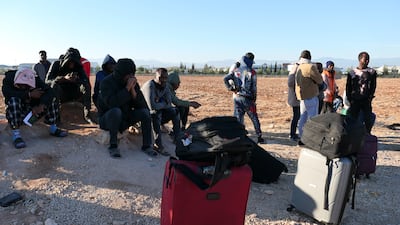Cyprus wants to suspend asylum applications over concerns of a demographic change as the number of migrants entering increased by nearly 40 per cent of 2020’s total.
The Cypriot government is blaming Turkey for the influx, accusing the breakaway Turkish Republic of Northern Cyprus of purposefully allowing – or turning a blind eye to – the activity along its porous border.
Government spokesman Marios Pelekanos spoke of “a clear policy by Turkey of taking advantage of human suffering, based on a prescribed and conscious policy, since the vast majority of [migrant] flows comes from that country”.
Mr Pelekanos said 10,868 irregular migrants arrived to the Republic of Cyprus in the first 10 months of 2021, more than 9,270 of them having crossed the Green Line, a UN buffer zone, from their northern neighbours.
Cyprus has been a divided island since a Greek-Cypriot coup in 1974, aimed at unity with Greece, prompted the invasion by Turkish mainland troops in the north, where they still remain.
A 180-kilometre zone monitored by a small UN peacekeeping force has stretched from east to west of the island for nearly half a century as talks aimed at reconciliation have been unsuccessful.
Turkey’s insistence on a two-state solution and the recent reopening of Varosha, a seaside resort town formerly inhabited by Greek-Cypriots and occupied by the TRNC since 1974, have been rebuked by western powers and the UN and fomented tension between the two sides.
Cyprus has been a Mediterranean safe haven for refugees fleeing conflicts in neighbouring countries for years, particularly for Syrians fleeing the protracted civil war only 500km away. Asylum seekers make up 4 per cent of the island’s population of one million, the highest per capita ratio of all 27 EU countries.
Given that the small country is split along ethno-religious lines, the increasing number of largely Muslim or Middle Eastern arrivals into the Greek-Cypriot south remains politically and socially sensitive.
Plea for solidarity from the EU
Mr Pelekanos said a request would be submitted to the European Commission to “take action”, including granting Cyprus the “right to suspend asylum applications by people entering the country illegally”.
He said Cyprus expected "EU solidarity for the immediate relocation of asylum seekers to other member states, but also the repatriation of asylum seekers to their countries of origin".
The government says that 15,000 people have had their asylum applications rejected but cannot be deported because there is no coherent EU policy or agreement with their home countries on sending them back.
However, refoulement – the forcible return of asylum seekers to a country in which there is a likely danger of persecution – is illegal under international law and unlikely to be agreed to by the EU.
Ministers agreed on a series of measures to tackle the surge in migration at an emergency meeting chaired by President Nicos Anastasiades.
The current influx added to the more than 33,000 people already illegally residing in the republic, the government spokesman said.
Mr Pelekanos said Cyprus was facing “very acute socio-economic effects” because of the “migration crisis”.
Since 2015, the EU has given Cyprus €117.6 million in funding towards migration and asylum but Mr Pelekanos said an additional €38m was added this year to provide food and shelter for migrants, and to cope with what he described as the “deteriorating situation”.


